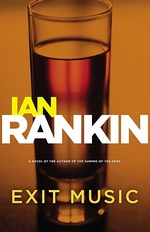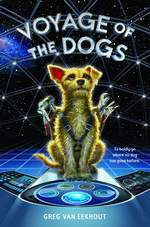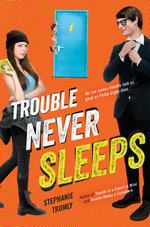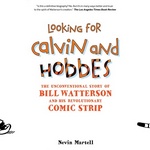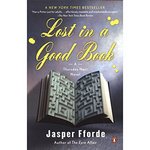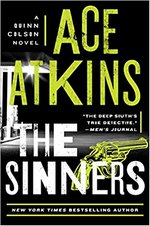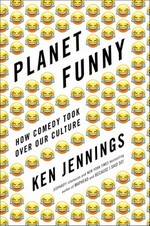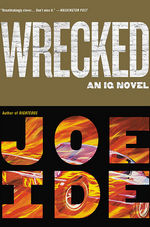 Wrecked
Wrecked
by Joe Ide
Series: IQ, #3Hardcover, 340 pg.
Mulholland Books, 2018
Read: October 19 – 22, 2018

At the end of Righteous, Isaiah meets a girl — I don’t remember much about it, but there’s something about her that clearly makes an impression on IQ — and his dog. It was enough to give us a little hope for our intrepid hero after everything he’d just gone through as we wrapped up the book. This book starts with the three of them bumping into each other again — this time IQ definitely is attracted to her and his dog and the woman clearly enjoy each other’s company. Which is great for them, but you feel a little bad for Isaiah.
Before long, Grace comes to Isaiah with a case. Her mother disappeared a decade ago — under a cloud, it should be added — and Grace saw her on the street near her home. Can Isaiah find her? She’s a painter trying to get a start and really can’t afford much — but gives him a painting as payment.
The catch is, Isaiah and Dodson have recently become partners and Dodson is determined to make Isaiah’s business legitimate. They’ve got a web presence, a Facebook page, and a strict policy on minimum fees. These fees have to be money. No lawn care services, cooking, et cetera. Dodson has a wife and child to provide for and he is inflexible on this point. Isaiah makes an exception and ignores Dodson’s complaints, once Dodson figures out Isaiah’s motivation to take the case, he acquiesces — like a good friend would.
What makes this case complicated is that Sarah, Grace’s mom, is trying to blackmail some very dangerous people. It takes a long time for us to get all the details behind the blackmailing (it’s absolutely worth the wait, and Ide does a great job revealing things to us in drips), but what’s important isn’t the why — it’s the reaction to the blackmail. Isaiah, Dodson and their clients have been in dangerous and tough spots before — but I promise you, those pale in comparison to this. These people bring a level of danger, a level of callousness, a level of professionalism, that will demand more from Isaiah than he’s used to — and he’ll have to find new ways to approach things to survive.
Meanwhile, there’s another blackmail story afoot. One of the darkest episodes of the partners’ (and Deronda’s) past comes back to bite them — a criminal act that they’ve gotten away with, primarily because no one knew they got away with anything. Somehow, word has gotten out, and someone wants money from them to stop him from going public with what he knows. If the victims of this crime — a couple of notorious drug dealers — find out, it will likely prove fatal. Dodson attempts to take care of this on his own, with a little help from Deronda.
Clearly, the partnership isn’t off to the strongest start.
There is a drink described here — not that anyone you’re supposed to like drinks it — that is possibly the most disgusting thing I’ve read this year, it’s a mix of vodka, Coke, and things that shouldn’t be consumed with each other. There are scenes of physical violence and torture in this book, horrible things really, but it’s Parks Punch that left scars.
Actually, there is something more painful, now that I think of it. Junior, one of the drug dealers that IQ, Dodson, and Deronda stole from before years ago appears frequently. He’s got the right idea — a better vocabulary can be tied to greater success in business and life in general. Sadly, Junior is better at acquiring words than he is using them. Resulting in sentences like:
My domicile has been exfoliated! Excavate the premises!
(when he discovers that his home has been broken into) or
Did you discover anything irrelevant?
(to Isaiah after searching for clues). Say what you will about waterboarding or Parks Punch — for me, those lines hurt (and I gave tame examples).
Well, they make me crack up — but they’re also painful.
The action is taut, the twists don’t stop and you have to hold on tight so the pacing doesn’t throw you from the vehicle in the last few chapters. But not only is this the best suspense that Ide’s given us, we have the some of the best emotional moments and character growth so far in the series. Some real trauma is visited on Isaiah, and it’ll be interesting to see how this impacts him going forward (there’s some indication that ide has something in mind along these lines). Similarly, I don’t think I’ve liked Dodson more than I did in this book and his character keeps growing and maturing — I am eager to see how Ide helps him grow in the future.
Unlike IQ or Righteous, we only have one timeline in Wrecked. This is such an improvement — that worked in IQ seemed a drawback in Righteous — but one timeline allows the reader, the pace and the action to focus on Grace and her case.
I’ve been a fan of Ide’s writing and this series since the moment I finished chapter 2 of IQ, but this book worked for me more than his previous work. I don’t know if it’s because I appreciate the characters and style more — or if it’s that Ide has grown with his experience and is delivering something better, I’m not sure. (my money is on the latter, but you never know) This is a fantastic entry very strong series that everyone should hop on board with (start at the beginning, it’s only 3 books — you have plenty of time to catch up).
—–




